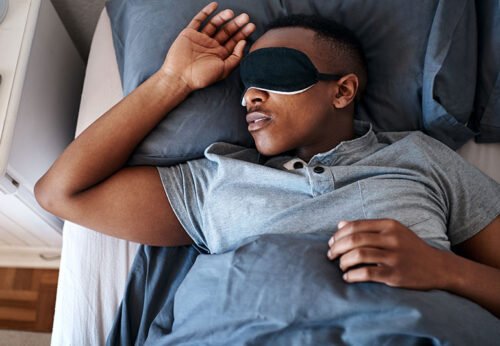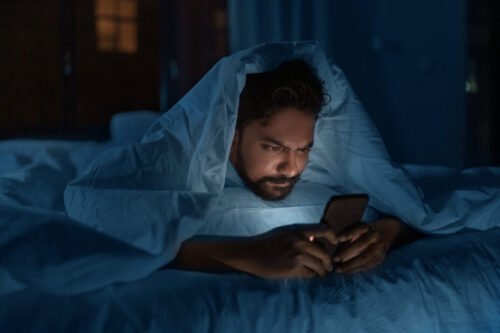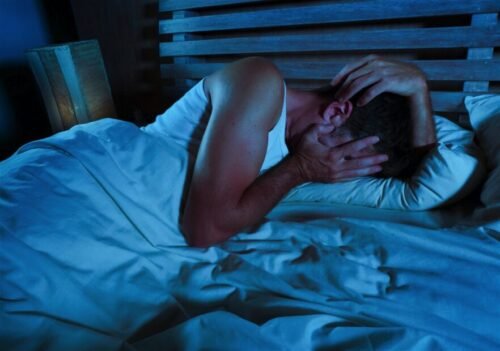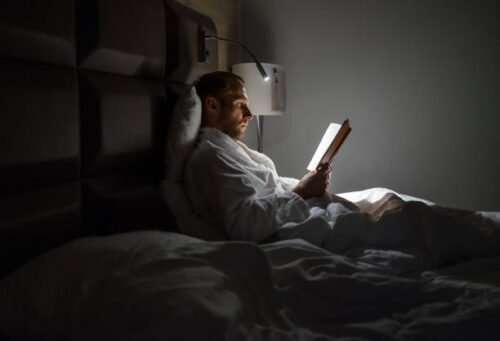Struggling to catch those elusive Z’s? ‘Enter Sandman’ is your go-to guide for transforming restless nights into peaceful slumber. From mastering sleep hygiene to unlocking the secrets of relaxation, this post has everything you need to drift off into dreamland effortlessly.
Introduction
In our previous posts on the subject, we have delved into why we sleep, its function and purpose. As well as the science of sleep – to help us get to grips with everything going on behind the scenes. Like a car mechanic, you need to know where the fault lies to fix the problem. So whether the fault is behavioural, environmental or otherwise this guide hopes to have some form of solution for you. Here, we’ll explore a variety of proven strategies, from establishing bedtime rituals and discipline to diet considerations and supplements to help you sleep. Whether you’re struggling with insomnia, battling late-night stress and anxiety, or simply looking to optimise your sleep routine, this guide has you covered.
NB : About the Sandman


Rooted in European mythology and folklore, the Sandman is a mysterious character responsible for bestowing dreams and restful slumber. He does this by sprinkling sand or dust into the eyes of sleepers. (Although his character occasionally took on a darker tone, associated with causing nightmares or taking children's eyes if they didn't sleep promptly).
Tips for Better Sleep
This comprehensive guide is a smorgasbord of solutions for your sleep issues. Whether it’s trouble falling asleep, staying asleep, or simply improving sleep quality, there’s something for everyone to explore and implement. Dive into the sections that resonate most with your sleep struggles and start picking away at them to find the strategies that work best for you.
Table of Contents
Sleep Hygiene:
Sleep hygiene refers to the habits and routines that promote healthy and restful sleep. The concept involves creating a sleep-friendly environment and establishing practical bedtime routines. It’s grounded in the understanding that creating optimal conditions for sleep positively influences its quality and duration. This can be achieved in several ways. For example, keeping our internal body clock in sync. Minimising sleep disruptors such as light exposure and stimulants, and winding down before bedtime. Good sleep hygiene promotes better sleep quality and overall health.


Eye masks and blackout blinds help create optimal darkness for better sleep by blocking out light. They promote deeper rest and maintain circadian rhythm.
Click on the links below for ideas to improve sleep hygiene.
Consistency in your sleep schedule is essential for regulating your body’s internal clock. Maintaining a regular sleep schedule involves going to bed and waking up at the same time every day, even on weekends. Avoid excessive daytime napping, especially late in the afternoon, as it can interfere with your ability to fall asleep at night. If necessary, gradually adjust your sleep schedule to align with your daily routine, especially if you have irregular work hours or engage in shift work.
A bedtime routine involves a series of calming activities performed each night before sleep to signal to your body that it’s time to wind down. It can encompass simple actions such as brushing teeth and washing your face, reading a calming book, or practising relaxation exercises like deep breathing. The goal is to avoid stimulating activities, such as intense work or watching action-packed TV shows, which can interfere with your ability to relax and fall asleep peacefully.
Your sleep environment significantly impacts the quality of your sleep. Recognize the importance of creating a sleep-friendly environment in your bedroom. Invest in your well-being by designing a space that optimises relaxation and sleep quality. To ensure a comfortable sleep environment, start by choosing a mattress and pillows that provide the necessary support and comfort (see below). Reducing clutter and creating a tidy space can help create a sense of calm and order. Simple actions like tidying up, relocating items, or organising your bedside table can make a significant difference. Avoid using your bedroom for activities like work, watching TV, or eating. Reserve the space exclusively for sleep and intimacy solely, to strengthen the association between your bedroom and restfulness. Personalise your bedroom with photos, plants, or ornaments for a comforting atmosphere. Select calming colours like softer tones to evoke relaxation, avoiding bright, stimulating hues.
Your bed is the cornerstone of a good night’s sleep, so it’s essential to ensure it’s comfortable and supportive. Sleeping on an old, uncomfortable mattress can disrupt your sleep and leave you feeling tired and achy. Look for a mattress that offers the right balance of support and comfort for your body type and preferences. Remember, what works for one person may not work for another, so take the time to find the best mattress for you. Maintaining good posture while sleeping is crucial, so choose a mattress that keeps your spine properly aligned.
Exposure to excessive light and noise can disrupt your sleep patterns. To minimise exposure, it’s advisable to turn off or dim bright lights in the evening hours. The use of blackout blinds or curtains can be highly effective in blocking out streetlights and other sources of unwanted light. Reducing noise disruptions can be achieved by using earplugs, noise-cancelling headphones, or white noise machines. Additionally, sleep masks can prove useful in blocking out any remaining sources of light that might hinder your ability to achieve a peaceful and uninterrupted night’s sleep.
Temperature control is crucial for quality sleep. Ideally, keep your bedroom cool, between 16-18°C (60-65°F), as your body temperature naturally drops during sleep. Higher temperatures over 24°C (71°F) can disrupt sleep, while colder temperatures around 12°C (53°F) may hinder falling asleep. Consider individual needs, like children or the elderly, who may prefer slightly warmer settings. Investing in a room thermometer and seasonal bedding can help maintain optimal sleep conditions, ensuring a comfortable night’s rest.
NB: Get Naked
While some of us wouldn’t dream of sleeping nude, there are some compelling reasons why you might consider sleeping in your birthday suit at night.

- Sleeping naked can play a role in regulating body temperature. If you're too warm in bed, your core body temperature might struggle to drop, which is necessary to initiate the sleep process.
- Sleeping naked is beneficial for the skin as it allows areas of the body to breathe, reducing the risk of skin diseases and enhancing blood circulation.
Incorporating these practices into your sleep hygiene routine can contribute to a more conducive sleep environment and enhance your ability to fall asleep faster and enjoy a restful night’s sleep. It’s important to remember that the effectiveness of these strategies may vary from person to person, so tailoring your sleep hygiene routine to suit your individual needs and preferences is crucial.
Sleep Duration:
The recommended amount of sleep varies across different age groups, with younger adults needing more sleep than older adults. (Adolescents need more sleep due to rapid growth, hormonal changes, and higher metabolic rates). Insufficient sleep duration has been linked to a range of negative health outcomes, including increased risk of obesity, diabetes, cardiovascular diseases, and mental health issues. Therefore, prioritising adequate sleep duration is essential for maintaining optimal physical and mental health throughout life.

Sleep needs vary by age: Infants require up to 17 hours, while adults typically need 7-9 hours for optimal health and function.
Click on the links below for more on sleep duration factors.
Recognizing these age-specific sleep requirements is essential for adapting sleep habits to fit one’s life stage. It’s helpful to have a general idea of the recommended amount of sleep for your age range.
- Infants and newborns: 14-17 hours a day.
- Children: Gradually decreasing sleep needs.
- Adolescents: 8-10 hours.
- Adults: 7-9 hours (with individual variations).
- Seniors: Changes in sleep patterns, often lighter and shorter durations.
NB: While these recommended sleep durations provide valuable guidance, individual variations in sleep needs exist. Some individuals may naturally require more or less sleep than the average for their age group.
Occasionally, people find themselves in situations where they’ve accumulated a sleep debt due to busy schedules or lifestyle choices. While it’s not ideal to consistently skimp on sleep and then try to compensate, it is possible to catch up on lost sleep to some extent. This process is known as “sleep debt repayment.” Individuals can allocate extra time for sleep during weekends or days off to help offset the deficits accumulated during the workweek. However, it’s essential to acknowledge that fully recovering lost sleep can take time, and it might not completely reverse the negative effects of prolonged sleep deprivation. Napping (see below) can also help pay back the sleep debt. However, developing consistent sleep habits and adhering to a regular sleep schedule remains the most effective strategy for maintaining overall sleep health and minimising the need for sleep debt repayment.
NB: For more on ‘sleep debt’ see our previous post on the science of sleep.
Sleep Disorders:
Sleep disorders encompass a range of conditions that can significantly disrupt one’s ability to achieve restful and restorative sleep. Among these disorders, insomnia stands as one of the most common. Sleep disorders like insomnia, sleep apnea, restless leg syndrome, narcolepsy, and parasomnias can have a profound impact on one’s sleep quality and overall well-being.
People experiencing sleep disorders may be referred to various specialists or treatment options based on their specific condition. These include:
- Primary Care Physician: Your regular doctor can provide initial evaluation and management of common sleep disorders. They may offer lifestyle recommendations, prescribe medications, or refer you to specialists if needed.
- Sleep Specialist (Sleep Medicine Physician): These doctors specialise in diagnosing and treating sleep disorders. They may conduct sleep studies (polysomnography) to evaluate sleep patterns and prescribe appropriate treatments, including medications, therapy, or devices like CPAP machines for sleep apnea.
- Psychiatrist or Psychologist: For sleep disorders with psychological components, such as insomnia or nightmares related to trauma, mental health professionals can offer therapy or counselling to address underlying issues.
- Neurologist: Neurologists specialise in disorders of the nervous system and may be involved in diagnosing and treating sleep disorders like narcolepsy or restless legs syndrome that have neurological components.
- ENT Specialist (Otolaryngologist): For sleep apnea or other breathing-related sleep disorders, an ear, nose, and throat specialist may evaluate and offer treatments such as surgery or continuous positive airway pressure (CPAP) therapy.
- Dental Specialist (Dentist or Orthodontist): In cases of sleep disorders like sleep apnea or teeth grinding (bruxism), dental professionals may provide oral appliances to help improve breathing or prevent tooth damage during sleep.
- Behavioral Sleep Medicine Specialist: These professionals focus on behavioural interventions for sleep disorders, such as cognitive-behavioural therapy for insomnia (CBT-I), which has been shown to be highly effective in treating insomnia.
It is essential to recognize the symptoms of these disorders and seek appropriate medical evaluation and treatment when necessary to improve sleep and enhance overall health.
Stress and Anxiety Management
Managing stress and anxiety is crucial for achieving restful sleep, yet many individuals struggle with these issues, leading to disrupted sleep patterns and reduced overall well-being.

Sleep can be elusive when anxiety or worries occupy the mind, disrupting the body’s natural sleep processes.
Common sources of anxiety before bedtime:
- Work-related Stress: Thinking about tasks or deadlines for the next day can cause anxiety and make it difficult to unwind before bed.
- Personal Relationships: Conflict or unresolved issues with family members, friends, or partners can lead to feelings of anxiety that interfere with sleep.
- Financial Concerns: Worrying about bills, expenses, or financial stability can keep individuals awake at night, especially when trying to budget or plan for the future.
- Health Issues: Concerns about one’s health or the health of loved ones, particularly if dealing with chronic illness or medical conditions, can cause anxiety before bedtime.
- Rumination: Dwelling on past events or mistakes, overthinking situations, or replaying conversations in one’s mind can lead to anxiety and difficulty falling asleep.
- News and Media: Consuming negative news or engaging with stressful content on social media or electronic devices before bed can heighten anxiety levels and interfere with sleep..
Fortunately, there are a range of potential solutions available to help tackle these issues. By understanding the impact of stress and anxiety on sleep and exploring various strategies for managing them, individuals can take proactive steps towards enhancing their sleep and overall health.
Dealing with stressors before bedtime:
- Promotes present-moment awareness.
- Calms racing thoughts.
- Induces relaxation.
- Simple Meditation: Find a quiet and comfortable place to sit or lie down. Close your eyes and take a few deep breaths to relax your body. Focus your attention on your breath, noticing the sensation of air entering and leaving your body. If your mind starts to wander, gently bring your focus back to your breath. Continue this practice for several minutes, allowing yourself to be fully present in the moment.
- Simple Mindfulness Technique: Choose an everyday activity, such as washing dishes or taking a shower, to practise mindfulness. Pay close attention to the sensations, sounds, and smells associated with the activity. Notice the temperature of the water, the texture of the soap, and the rhythm of your movements. Whenever your mind starts to wander, gently bring your focus back to the present moment and the task at hand. This practice can help cultivate mindfulness in your daily life and promote a sense of calm and awareness.
- Encourage deliberate, slow breaths.
- Alleviate tension and anxiety.
- Find a comfortable sitting or lying position and close your eyes. Inhale deeply through your nose, counting to four as you fill your lungs with air. Hold your breath for a count of four, then exhale slowly through your mouth for a count of six, focusing on fully emptying your lungs. Repeat this pattern for several minutes, allowing yourself to become fully present in the rhythm of your breath. Deep breathing can help calm the mind and body, preparing you for sleep.
- Systematically tenses and releases muscle groups.
- Targets physical tension associated with stress.
- To practise PMR, find a comfortable position and start by tensing the muscles in your feet as tightly as you can for a few seconds, then slowly release the tension and allow the muscles to relax completely. Move on to the muscles in your calves, thighs, abdomen, chest, arms, and so on, progressively working your way up through the body. With each muscle group, tense the muscles for a few seconds before releasing the tension and focusing on the sensation of relaxation. PMR can help alleviate physical tension and prepare the body for a more restful sleep.
- Enhance physical health.
- Cultivate mindfulness.
- Reduce stress through physical postures and mindfulness practices.
- CBT-I typically involves identifying and changing thoughts and behaviours that contribute to insomnia, establishing a regular sleep schedule, and practising relaxation techniques to improve sleep quality
- Offers structured therapeutic approaches.
- You can see a therapist or sleep specialist for CBT-I. They’ll guide you through the therapy, which often involves weekly sessions where you learn techniques to improve sleep habits and manage sleep-related worries.
- Writing down thoughts and feelings before bedtime can help clear the mind and reduce rumination, promoting better sleep.
- Journaling before bedtime can also serve as a way to track patterns and identify potential triggers for sleep disturbances, providing valuable insights for improving sleep quality over time.
- Confronting obstacles and committing to finding solutions can lead to a profound sense of relief and satisfaction, alleviating stress and anxiety. It positively impacts overall well-being and enhances the ability to achieve restorative sleep.
- Addressing stressors earlier in the evening and then consciously closing the door on those concerns before bedtime can be a helpful strategy.
- By acknowledging that you’ve done what you can for the day and letting go of worries that can’t be immediately resolved, you allow yourself to shift focus to relaxation and prepare your mind for restorative sleep.
- Experimenting with other relaxation techniques such as visualisation, progressive relaxation, or guided imagery to calm the mind and body before sleep.
- Relaxation techniques such as visualisation involves mentally picturing calming scenes or scenarios, while progressive relaxation entails systematically tensing and then relaxing different muscle groups in the body to release physical tension. Guided imagery involves listening to or following prompts that guide you through relaxing mental imagery or scenarios. These techniques can help calm the mind and body before sleep by reducing stress and promoting a state of relaxation conducive to falling asleep.
- Talk to a therapist or counsellor if stress and anxiety are significantly impacting your sleep quality and overall well-being.
- Therapy can provide coping strategies and support tailored to your individual needs.
Diet and Nutrition
Eating before bedtime can have both positive and negative effects on sleep quality. Here we will explore arguments for and against eating before bedtime:

Eating before bedtime can disrupt digestion and lead to discomfort during sleep, impacting overall sleep quality.
The Debate on Eating Before Bed: Pros and Cons
A crucial aspect of achieving a good night’s sleep is the type of food we consume and the timing of our eating. Understanding the impact of our dietary choices on sleep quality can make a significant difference in our restorative rest. Some foods contain nutrients or compounds that can aid in promoting sleep. For example, certain fruits contain compounds like magnesium and serotonin (associated with improved sleep quality). Conversely, it’s equally essential to be mindful of certain foods to avoid before bedtime. In particular, foods that can cause indigestion, discomfort or overstimulate the brain.
Arguments for Eating Before Bedtime:
- Blood Sugar Regulation: Consuming a small, balanced snack before bed can help stabilise blood sugar levels throughout the night. This can prevent drops in blood sugar that may wake you up during the night or disrupt sleep.
- Sleep-Inducing Nutrients: Some foods contain nutrients like tryptophan, magnesium, and melatonin, which can promote relaxation and help initiate sleep. For example, foods like turkey, dairy products, nuts, and bananas contain tryptophan, an amino acid precursor to serotonin and melatonin.
- Carbohydrates and Body Repair: Consuming carbohydrates before bedtime can provide the body with a source of energy for overnight metabolic processes, including body repair and maintenance. While excess carbohydrate consumption can contribute to weight gain if not balanced with energy expenditure, carbohydrates also play a crucial role in replenishing glycogen stores and supporting muscle repair during sleep.
- Preventing Hunger: Eating a small snack before bed can prevent hunger pangs during the night, which may otherwise disturb sleep. Feeling hungry can make it difficult to fall asleep or stay asleep, so a light snack can help keep hunger at bay.
Arguments against Eating Before Bedtime:
- Digestive Discomfort: Eating a large meal or heavy, spicy foods too close to bedtime can lead to digestive discomfort, such as indigestion or heartburn. This discomfort can make it difficult to fall asleep or stay asleep comfortably. Although the digestive process continues during sleep, certain types of food, particularly high-fat or high-fibre foods, may take longer to digest. This can potentially cause discomfort or indigestion and disrupt sleep quality.
- Stress on heart and digestive system: Stress on heart and digestive system: Heavy meals before bed strain the heart and digestive system as they work overtime to process the food. It can result in a temporary increase in heart rate and blood pressure as the body diverts blood flow to the digestive organs. Over time, consistently eating heavy meals before bedtime may contribute to cardiovascular issues such as high blood pressure or heart disease, particularly in individuals with existing heart conditions or risk factors. Opting for lighter, well-balanced meals or snacks earlier in the evening allows for adequate digestion and may help support heart health.
- Disrupted Sleep Patterns: Consuming certain foods or beverages before bed, such as those containing caffeine or alcohol, can disrupt sleep patterns. Caffeine is a stimulant that can interfere with falling asleep, while alcohol may initially induce drowsiness but disrupts the sleep cycle later in the night (For more on stimulants see below).
- Weight Gain: Eating before bedtime may contribute to weight gain if the calories consumed exceed your daily energy needs. Furthermore, the body’s metabolism tends to slow down during sleep, meaning that fewer calories are burned compared to during wakefulness. Therefore, consuming excess calories late at night, especially from high-sugar or high-fat foods, can more easily lead to weight gain as these calories may not be fully utilised or metabolised during sleep.
Discussion
Whether eating before bedtime is beneficial or detrimental depends on various factors, including the type and quantity of food consumed, individual metabolism, and personal preferences. While a light, balanced snack containing sleep-promoting nutrients may aid sleep quality for some individuals, others may find that avoiding food close to bedtime helps them sleep better. It’s essential to listen to your body’s signals and experiment with different eating patterns to determine what works best for you in terms of sleep quality and overall well-being. Additionally, weight gain from bedtime eating is possible with excessive calorie intake, but balance and timing matter. A balanced bedtime snack, with carbs, protein, and healthy fats, supports metabolism and energy stability without major weight gain. Yet, overeating high-sugar or high-fat foods late at night can lead to long-term weight gain.
Factors to consider if you have the munchies before bedtime:
- Foods containing Tryptophan: Incorporating foods rich in tryptophan (an amino acid), such as turkey, chicken, nuts, and dairy products, can promote the production of sleep-regulating hormones like serotonin and melatonin.
- Other nutrients to consider: Additionally, certain nutrients like lycopene, carbohydrates, vitamin C, selenium, and lutein/zeaxanthin have been linked to improved sleep quality. Foods like bananas, fish, chickpeas, whole grain cereals, calcium-rich dairy products, and almonds are beneficial for promoting relaxation and aiding restful sleep.
- Timing of meals: Timing your meals and snacks is also key. Opt for a light, balanced meal a few hours before bedtime and choose snacks that contain complex carbohydrates and protein to optimise tryptophan levels. Maintaining a balanced diet that includes a variety of nutrients supports overall health and sleep regulation.
- Overeating: As mentioned, overeating before bedtime should be avoided as it can lead to discomfort, indigestion, and disruptions to sleep patterns. Consuming a large meal late at night overwhelms the digestive system, making it difficult for the body to efficiently process food and interfering with essential sleep processes. Additionally, overconsumption of calories before bedtime increases the risk of weight gain over time, as the body’s metabolism slows down during sleep, leading to the storage of excess calories as fat.
Foods that can aid with sleep:
Almonds are a good source of magnesium, which is known to promote muscle relaxation and reduce stress. They also contain protein, which helps stabilise blood sugar levels and switch the body into rest-and-digest mode.
Warm milk contains tryptophan, an amino acid precursor to serotonin and melatonin (neurotransmitters that regulate sleep and promote relaxation). Additionally, the warmth of the milk can have a soothing effect, helping you feel more relaxed before bedtime.
Kiwifruit is rich in antioxidants and serotonin, which can help regulate sleep cycles and improve sleep quality. It also contains folate, which may help regulate mood and reduce symptoms of insomnia.
Chamomile tea has long been used as a natural remedy for insomnia and anxiety due to its calming properties. It contains compounds like apigenin, which bind to certain receptors in the brain that may promote sleepiness and relaxation.
Walnuts are a good source of omega-3 fatty acids, which have been associated with improved sleep quality. They also contain melatonin, the hormone that regulates sleep-wake cycles, as well as magnesium and tryptophan, which promote relaxation and sleep.
Tart cherries, particularly Montmorency cherries, are rich in melatonin, making them a natural source of this sleep-promoting hormone. Consuming tart cherry juice or whole cherries may help regulate sleep patterns and improve sleep quality.
Fatty fish like salmon, trout, and mackerel are high in omega-3 fatty acids, which have been linked to improved sleep quality and reduced symptoms of insomnia. They also contain vitamin D, which may help regulate serotonin levels and improve mood.
Barley grass powder is a nutrient-dense superfood that contains vitamins, minerals, and antioxidants that support overall health. While there isn’t specific research on its effects on sleep, its nutritional content may indirectly support better sleep by promoting overall well-being.
Lettuce contains lactucarium, a natural sedative that has been used traditionally to promote relaxation and sleep. While the evidence is anecdotal, some people find that consuming lettuce or lettuce tea before bedtime can help induce sleepiness.

If snacking before bedtime, look to sleep-friendly foods like almonds, kiwi, and cherries, known to contain sleep-promoting nutrients such as melatonin and magnesium.
Foods to avoid before bedtime:
Found in coffee, tea, chocolate, and some soft drinks, caffeine is a stimulant that can interfere with falling asleep and disrupt sleep patterns by increasing alertness and delaying the onset of sleep.
While alcohol may initially induce drowsiness, it disrupts sleep patterns later in the night, leading to fragmented and less restorative sleep. It can also exacerbate snoring and sleep apnea.
Spicy foods can cause heartburn or acid reflux, especially when lying down, leading to discomfort and disrupting sleep. Additionally, they may increase body temperature, which can interfere with the body’s natural cooling process during sleep.
Consuming foods high in sugar before bedtime can cause spikes in blood sugar levels, followed by rapid drops, leading to fluctuations in energy levels and potentially disrupting sleep. Additionally, sugary foods may contribute to dental issues if consumed close to bedtime without proper oral hygiene.
High-fat foods can take longer to digest, leading to discomfort, indigestion, or acid reflux during sleep. They may also contribute to weight gain if consumed in excess, as the body’s metabolism tends to slow down during sleep.
Eating large or heavy meals close to bedtime can lead to discomfort, bloating, or indigestion, making it difficult to fall asleep or stay asleep comfortably. It’s best to allow ample time for digestion before lying down to sleep.
Foods high in acidity, such as citrus fruits or tomatoes, can cause heartburn or acid reflux, especially when consumed close to bedtime. These symptoms can disrupt sleep and lead to discomfort during the night.

Avoiding heavy or spicy foods before bedtime can reduce the risk of indigestion and promote better sleep quality. Opt for lighter, easily digestible options to support a restful night.
Avoiding these foods before bedtime can help promote better sleep quality and overall well-being by reducing the risk of discomfort, indigestion, and disruptions to sleep patterns. Opting for lighter, balanced meals or snacks that are easier to digest and less likely to cause discomfort can contribute to a more restful night’s sleep.
Stimulants

Be wary of taking a chance with coffee in the hours leading up to bedtime; its stimulating effects can disrupt your sleep and lead to restless nights.
Click on the links below for more on stimulants and their impact on sleep:
Understanding the impact of caffeine on sleep begins with recognizing its half-life and how it affects the body. Caffeine is a stimulant found in various beverages and products like coffee, tea, energy drinks, and even some medications. Its half-life, which is the time it takes for half of the caffeine to be eliminated from the body, varies from person to person but generally ranges from three to five hours. This means that if you consume a cup of coffee with 100 milligrams of caffeine, roughly 50 milligrams will still be in your system after five hours. To minimise disruption to your sleep, it’s advisable to limit caffeine intake, particularly in the afternoon and evening. Avoiding caffeine at least six hours before bedtime can help ensure a smoother transition into a restful sleep.
Alcohol, often perceived as a relaxant, can have complex effects on sleep patterns. While it may initially induce drowsiness and make you fall asleep faster, it can lead to fragmented and disrupted sleep throughout the night. Alcohol interferes with the normal sleep cycle, reducing the amount of REM (rapid eye movement) sleep, which is crucial for restorative rest. Additionally, it can exacerbate issues like snoring and sleep apnea. Even small to moderate amounts of alcohol can have these effects, so it’s important to be mindful of your alcohol consumption, especially close to bedtime. It’s advisable to avoid alcohol for several hours before going to sleep to ensure better sleep quality and continuity.
Energy drinks are popular beverages often consumed for their stimulating effects, but reliance on them as a short-term pick-me-up can have detrimental effects on sleep patterns and overall health. These drinks typically contain high levels of caffeine, sugar, and other stimulants such as taurine or guarana, which can provide a temporary boost in energy and concentration. However, the high caffeine content in energy drinks can interfere with the body’s natural sleep-wake cycle by blocking adenosine receptors in the brain, which promotes wakefulness. This can lead to difficulty falling asleep, disrupted sleep patterns, and reduced overall sleep quality, especially if consumed later in the day. Additionally, the high sugar content in many energy drinks can cause rapid spikes and crashes in blood sugar levels, leading to feelings of fatigue and irritability once the initial energy boost wears off. Long-term consumption of energy drinks has been associated with various health risks, including increased heart rate, elevated blood pressure, and even adverse effects on mental health. Don’t rely on caffeine or energy drinks as a short-term pick-me-up. They may boost your energy and concentration temporarily, but can disrupt your sleep patterns even further in the long term.
To maintain a healthy sleep routine, it’s essential to establish guidelines for the responsible consumption of stimulants. For caffeine and energy drinks, consider your personal tolerance and sensitivity to its effects. Limit your intake to the morning and early afternoon hours to minimise interference with sleep. If you find that your sleep is affected even when consumed earlier in the day, you may want to reduce your overall intake. Regarding alcohol, moderation is key. If you choose to consume alcohol, do so in moderation and avoid excessive drinking, especially before bedtime. Aim to finish alcoholic beverages at least three to four hours before going to sleep to allow your body adequate time to metabolise the alcohol. Staying hydrated with water can also help mitigate the dehydrating effects of alcohol. Ultimately, responsible consumption of stimulants is an essential aspect of maintaining healthy sleep habits.
Hopefully this brief look into the relationship between diet and sleep has shed light on the importance of mindful eating for optimal rest. We’ve examined the potential benefits of sleep-promoting nutrients and the drawbacks of certain food choices before bedtime. Consideration of mindful eating habits can help pave the way for better sleep and overall well-being.
Regular Exercise
Regular exercise offers numerous benefits, and one of them is improved sleep quality. Engaging in physical activity on a regular basis has been shown to help individuals fall asleep faster and enjoy deeper, more restorative sleep.

Getting the balance right: Exercising before bed can promote relaxation and aid sleep, but intense workouts may elevate heart rate and body temperature, hindering the ability to fall asleep easily.
When it comes to the types of exercise, different types of training each have their own advantages. Click on the links below for more:
Strength training offers several benefits for sleep quality. It boosts metabolism through muscle mass increase, facilitating more restful sleep patterns. Moreover, regular strength training stimulates the release of sleep-regulating hormones like growth hormone and testosterone. Additionally, the physical exertion involved in strength training helps alleviate stress and anxiety, fostering relaxation and enhancing sleep quality. In essence, integrating strength training into your routine can significantly improve both sleep and overall well-being.
Aerobic exercises like running, cycling, or swimming also have a beneficial effect on sleep quality. These activities elevate heart rate and circulation, triggering the release of endorphins that alleviate stress and enhance mood, thereby improving sleep. Furthermore, aerobic exercise has been associated with reduced symptoms of insomnia and other sleep disorders. Consistent engagement in aerobic activities can also fatigue the body, facilitating easier sleep onset and maintenance throughout the night.
While exercise is generally beneficial for sleep, it’s essential to be mindful of the intensity of your workouts, particularly as bedtime approaches. Intense and high-impact workouts, such as high-intensity interval training (HIIT) or heavy weightlifting, can elevate your heart rate and body temperature, making it challenging to transition into a relaxed state conducive to sleep. It’s generally recommended to avoid vigorous exercise close to bedtime, as the adrenaline and increased heart rate may make it difficult for some individuals to wind down. Instead, aim to schedule your exercise routine earlier in the evening, ideally several hours before bedtime, to allow your body to cool down and your adrenaline levels to return to normal. Note the use of the word ‘generally recommended’, for some people vigorous strength and cardio workouts late in the evening leave them wiped out. Once they return home they have no problem sleeping. Experiment and do what works for you.
In addition to strength training and aerobic exercises, there are various other physical activities that can improve sleep quality. Practices like yoga combine gentle movements with focused breathing and mindfulness techniques, which help reduce stress and promote relaxation. Research shows that these practices not only enhance sleep quality and duration but also alleviate symptoms of insomnia and sleep-related issues. Additionally, activities such as stretching, walking, or swimming—low-impact exercises—can calm the body and mind, making it easier to fall asleep and stay asleep throughout the night. Experimenting with different types of exercise tailored to individual preferences can be a valuable approach to improving sleep habits and overall well-being.
In summary, regular exercise can significantly improve sleep quality, but it’s important to consider the types of exercises you engage in, and the intensity of your training sessions and the timing of your workouts. By doing so, you can harness the sleep-enhancing benefits of physical activity while ensuring that your exercise routine doesn’t interfere with your ability to get a good night’s rest.
Electronic Devices and Screen Time
The digital age has profoundly altered our sleep routines, often in ways we may not fully recognize. Here we look at the various ways technology (digital devices and social media in particular) have impacted upon our sleep habits and overall sleep quality.

Limiting blue light exposure from screens before bedtime can help regulate your body’s natural sleep-wake cycle and improve sleep quality.
Click on the links below for more on electronics and screen times impact on sleep:
In today’s digital age, electronic devices like smartphones, tablets, and computers have become an integral part of our daily lives. However, their use, especially before bedtime, can significantly impact our sleep quality. One crucial aspect to consider is blue light exposure emitted by these devices. Blue light can interfere with the body’s natural circadian rhythm by suppressing the production of melatonin, a hormone that regulates sleep (See the Science of Sleep). This disruption to our internal clock can make it challenging to fall asleep and maintain a restful slumber.
Digital curfews involve setting limits on the use of electronic devices, such as smartphones, computers, and tablets, especially in the time leading up to bedtime. By establishing a designated “digital curfew,” individuals refrain from using screens at least an hour before they plan to sleep. This practice is beneficial because it allows the brain to unwind and prepare for rest without the stimulating effects of screens, such as the blue light emitted by devices, which can interfere with the body’s natural sleep-wake cycle. Implementing digital curfews for both adults and children can promote healthier sleep habits by ensuring that screen time doesn’t negatively impact the quality and duration of sleep.
- Banish Technology for Better Rest: Remove all technology from the bedroom, including TVs and computers. Eliminating electronic distractions reduces the temptation to engage with screens when you should be sleeping, leading to less disrupted sleep.
- Diminish LED Displays for Restorative Sleep: Turn off all digital displays, including mobile phones, tablets, and alarm clocks, especially those with LED displays, before bedtime to minimise sleep disruptions and promote deeper rest.
If you simply can’t stay away from your phone or tablet for that long, you might consider using a blue light filter. Many modern devices offer features like Night Mode and blue light filters, which can help reduce the amount of blue light emitted by the screen. By activating Night Mode or a blue light filter in the evening, you create a warmer and less stimulating display on your device. These filters work by minimising the disruptive effects of blue light, making it easier for your body to transition into sleep mode without being exposed to stimulating light for extended periods.
Social media platforms are a common source of screen time before sleep, and they can have a profound impact on sleep quality. Scrolling through social media feeds or engaging in emotionally charged online interactions can trigger stress, anxiety, or excitement, all of which are detrimental to falling asleep. Additionally, the constant influx of new information and notifications can keep individuals mentally engaged and make it difficult to disconnect from the digital world. To improve sleep, it’s advisable to establish boundaries regarding social media usage before bedtime and consider implementing digital detox practices to reduce the emotional and psychological impact of online interactions on sleep.
Electronic devices and screen time management are crucial aspects of maintaining healthy sleep patterns. Understanding the effects of blue light, setting screen time limits, using blue light filters, and being mindful of the impact of social media can contribute to better sleep hygiene and improved overall sleep quality.
Daylight Considerations
Daylight crucially influences our sleep-wake cycles by impacting our circadian rhythms. However, disruptions to our exposure to daylight can potentially affect our sleep patterns. This section explores practical solutions to overcome these challenges and optimise sleep.

Exposure to morning sunlight is key for regulating your body’s internal clock, which is essential for a healthy sleep-wake cycle.
Click on the links below for more on the impact of sunlight on our body clocks:
Sunshine significantly influences our circadian rhythms, which in turn regulate our sleep-wake cycles. Our circadian rhythms are essentially our body’s internal clock, which helps regulate when we feel awake and when we feel sleepy. Exposure to daylight first thing in the morning helps synchronise this internal clock. This makes it easier for us to wake up in the morning and feel alert during the day, while also signalling our body to start winding down and preparing for sleep as it gets darker in the evening. Additionally, sunlight aids in vitamin D production, linked to improved sleep and mood regulation. Incorporating morning sunlight into your routine can enhance sleep patterns, boost daytime alertness, and improve overall sleep quality.
Disruptions to our sleep patterns can occur when our bodies lack consistent cues from daylight. Without exposure to morning sunlight, often due to spending excessive time indoors or irregular schedules, our internal clocks can become confused about wakefulness and sleepiness. This confusion can result in difficulty falling asleep or staying asleep later in the evening, disrupting our overall sleep-wake cycles. To maintain healthy sleep patterns, prioritising regular exposure to natural daylight, particularly in the morning, and establishing consistent sleep routines in the evening are essential.
Since, our body clocks rely on environmental cues like light/darkness and temperature. Generally, we feel more alert when the sun is shining and more likely to hibernate when it’s dark. Changes in daylight between summer and winter, experiencing jet lag, or working shifts can throw our body clocks off track. This disrupts sleeping and eating patterns but also mood and mental alertness.
Prioritising exposure to daylight first thing in the morning can be beneficial for syncing the body clock with the external day-night cycle. This can be achieved by spending time outdoors or near windows upon waking, engaging in morning activities like walking or exercising outdoors, or simply opening curtains and blinds to allow natural light into indoor spaces. Creating a consistent routine of morning sunlight exposure can help establish a healthy sleep-wake cycle and promote better sleep quality. If this can be difficult (working indoors etc), consider incorporating natural light emitters indoors, such as full-spectrum bulbs or light therapy lamps. These can help mimic the effects of sunlight and regulate circadian rhythms, especially during periods of limited daylight exposure. Lastly, during seasons with limited daylight, try to maintain a regular sleep schedule and optimise indoor lighting conditions to mitigate disruptions to sleep patterns and overall well-being.
(For more on circadian rhythms and sleep-wake cycles see our post on the Science of Sleep).
Electronic devices and screen time management are crucial aspects of maintaining healthy sleep patterns. Understanding the effects of blue light, setting screen time limits, using blue light filters, and being mindful of the impact of social media can contribute to better sleep hygiene and improved overall sleep quality.
Sleep Aids
Sleep aids come in various forms, from natural remedies to prescribed medications. Natural sleep aids aim to promote relaxation and regulate the sleep-wake cycle through non-pharmacological means. Prescribed medications may be recommended for individuals with more severe sleep disturbances.


Utilizing natural sleep aids such as aromatherapy, cold showers, and binaural beats can effectively help the body wind down in preparation for sleep.
Natural Sleep Aids:
Natural sleep aids encompass a range of holistic approaches aimed at enhancing sleep quality and promoting restful nights. While medical interventions can be effective for some individuals, many people opt for more holistic methods, such as lifestyle changes, relaxation techniques, and natural remedies. Each person’s journey to better sleep is unique, and it’s essential to explore various options to find what works best for you. In this discussion, we shall cover the natural remedies first, with a subsequent section addressing pharmaceutical options for those inclined towards medication.
Click on the links below for more on natural sleeping aids:
Used before bedtime these can offer surprising benefits for sleep quality. The sudden exposure to cold water can stimulate the body’s parasympathetic nervous system, triggering a relaxation response and lowering heart rate and blood pressure. Additionally, the rapid change in body temperature induced by a cold shower can promote the release of melatonin, the hormone responsible for regulating sleep-wake cycles. This natural increase in melatonin levels can help signal to the body that it’s time to wind down and prepare for sleep. Furthermore, cold showers may alleviate muscle tension and reduce stress levels, creating a more conducive environment for restful sleep. Integrating a cold shower into a bedtime routine can serve as a refreshing and effective way to promote better sleep hygiene and overall sleep quality.
Before bedtime these can also be a soothing ritual to promote better sleep quality. As the body absorbs the warmth of the water, it triggers a natural drop in body temperature upon exiting the bath, mimicking the temperature decline that occurs during the sleep cycle. This decrease in body temperature signals to the body that it’s time to wind down and prepare for sleep. Additionally, hot baths can promote relaxation and alleviate muscle tension, especially when combined with practices such as progressive muscle relaxation or deep breathing exercises. By incorporating hot baths into a bedtime routine, individuals can create a calming environment that promotes relaxation and enhances overall sleep hygiene.
Another effective natural remedy is the use of white noise and sound machines. These devices create a consistent, soothing background noise that can drown out disruptive sounds and provide a sense of comfort. White noise, in particular, can help mask sporadic disturbances, allowing individuals to maintain a more stable sleep environment. Whether it’s the sound of ocean waves, rainfall, or simply white noise, these machines can create a calming auditory backdrop that promotes uninterrupted sleep.
Binaural beats are an auditory illusion created by presenting two different frequencies to each ear simultaneously. When experienced through stereo headphones, this phenomenon generates a third frequency, known as the binaural beat, corresponding to the difference between the two presented frequencies. Advocates suggest that listening to binaural beats can influence brainwave activity, potentially inducing states of relaxation, meditation, or sleep. For instance, specific frequencies targeting theta waves for relaxation or delta waves for deep sleep may help entrain the brain to synchronise with desired states. While research on their efficacy is limited, some studies indicate that binaural beats could positively impact subjective sleep quality and relaxation. Incorporating binaural beats into a bedtime routine offers a non-invasive and drug-free approach to enhancing sleep hygiene and overall well-being.
This can serve as a soothing bedtime ritual, promoting relaxation and aiding sleep. Engaging in calm and gentle narratives or informative discussions can help distract the mind from racing thoughts or worries, facilitating a smoother transition into sleep. Opting for content that is not overly stimulating or emotionally charged can further promote a sense of calmness and ease. Additionally, listening to familiar or comforting voices can provide a sense of companionship, which may alleviate feelings of loneliness or anxiety that can sometimes interfere with sleep. Overall, incorporating podcasts or audiobooks into your bedtime routine can be a pleasant and effective way to unwind and prepare for a restful night’s sleep.
Traditional or alternative remedies that can improve sleep include:
- Valerian: Known for its calming effects.
- St. John’s Wort: May help alleviate mild depression and anxiety.
- Passionflower Tea: Celebrated for its relaxation properties.
- Kava: A Pacific Island herb used for its calming effects.
- Chamomile: Often used for its calming and soothing properties.
- Lavender: Known for its relaxing aroma, often used in aromatherapy.
- Lemon Balm: May help reduce anxiety and promote relaxation.
- Ashwagandha: An adaptogenic herb that may help reduce stress and improve sleep quality.
- Skullcap: Traditionally used to promote relaxation and relieve nervous tension.
These harness the power of soothing scents to induce relaxation. Lavender, for instance, is known for its calming properties and can be diffused or applied topically to promote a tranquil atmosphere conducive to sleep. Several other herbs and essential oils are known for their sleep-inducing properties. Some popular options include chamomile, valerian, bergamot, sandalwood, and ylang ylang. These herbs and oils can be incorporated into your bedtime routine in various ways. You can diffuse them using an essential oil diffuser in your bedroom, add a few drops to a warm bath for a relaxing soak, or dilute them in a carrier oil to create a soothing massage oil or lotion. Experimenting with different scents and methods of use can help you find the most effective way to promote restful sleep and relaxation.
Incorporating these natural remedies into your sleep routine can offer gentle and holistic support for achieving a restful night’s sleep. Experimenting with different approaches and finding the combination that works best for you can lead to a more consistent and rejuvenating sleep experience, all without the need for medication or external interventions.
Medication:
There are a number of medication options to consider under the category of sleep aids:
These are readily available at most pharmacies and stores without the need for a prescription. These typically include medications containing ingredients like diphenhydramine or doxylamine, which are designed to induce drowsiness. While they can be helpful for occasional sleeplessness, it’s crucial to use them sparingly and in accordance with the recommended dosage to avoid dependence.
These are typically prescribed by a healthcare provider when chronic sleep issues or sleep disorders are diagnosed. These medications may include benzodiazepines, non-benzodiazepine sedative-hypnotics, or other types of drugs that have a more potent effect on sleep regulation. It’s important to note that these medications come with potential side effects and risks, such as dizziness, grogginess, and the risk of developing dependence or tolerance over time. Therefore, they should only be used under the close supervision of a healthcare professional who can determine the most suitable option based on an individual’s specific needs and medical history.
Consultation with a healthcare provider is a critical step for anyone considering the use of sleep aids, whether over-the-counter or prescription. Your healthcare provider can conduct a thorough evaluation of your sleep patterns, assess any underlying medical conditions or medications that may be affecting your sleep, and recommend the most appropriate course of action. They can also provide guidance on the proper use of sleep aids, potential alternatives, and strategies for improving sleep naturally. In some cases, addressing the root causes of sleep disturbances through lifestyle changes and behavioural therapies may be a more effective and sustainable approach than relying solely on medication.
A variety of sleep aids are available, including over-the-counter and prescription options. It’s essential to find what works best for you with guidance from a healthcare provider. It is best to speak with a doctor/dietician before taking any new supplements to ensure that they will not interact with other medications or supplements or affect any existing medical conditions.
Tips for Shift Workers:
Shift workers face unique challenges when it comes to maintaining healthy sleep patterns due to irregular work hours. To help shift workers get the restorative sleep they need, it’s essential to focus on several key aspects:

Shift work disrupts natural sleep patterns, making it challenging for many to get quality rest. Finding strategies to adapt sleep schedules can be crucial for shift workers’ overall well-being.
Click on the links below for more on sleep and shiftwork:
First, creating a dark and quiet sleep environment is paramount. Since shift workers often need to sleep during daylight hours, blackout curtains or shades can block out sunlight, while noise-cancelling headphones or white noise machines can minimise disturbances from the outside world, ensuring a more conducive sleep atmosphere. (for more on this see ‘Sleep Hygiene’ section above).
Developing a shift-specific sleep schedule is another vital aspect of managing shift work. This involves aligning one’s sleep patterns with their work schedule. It’s important to establish a consistent sleep routine, even on days off, to regulate the body’s internal clock. By adhering to a set bedtime and wake-up time, shift workers can help their bodies adapt to their non-traditional work hours more effectively.
Changing shifts poses a significant challenge for shift workers, as rapid transitions between day and night shifts can disrupt circadian rhythms. To ease this transition, individuals can gradually adjust their sleep schedule leading up to a shift change and strategically expose themselves to light at specific times. Transitioning back from night shifts to normal hours requires resetting the body’s internal clock, achieved through exposure to natural light during the day and dimming lights in the evening. Limiting daytime naps, establishing a relaxing bedtime routine, and maintaining good sleep hygiene are also essential for facilitating this transition and promoting a regular sleep-wake cycle.
SWSD is a condition that can affect shift workers and is characterised by excessive sleepiness and insomnia. To address this, shift workers should be aware of the symptoms and seek medical advice if needed. Treatment options may include behavioural therapy, lifestyle adjustments, or prescribed medications, all of which can significantly improve sleep quality.
In summary, shift workers can improve their sleep quality and well-being by adhering to good sleep hygiene, establishing a shift-specific sleep schedule, and using strategies for transitioning between shifts. These practices are vital for ensuring that shift workers obtain the restful sleep necessary to support their health and job performance while working non-standard hours.
Power Napping
Napping serves as a valuable tool for boosting daytime alertness and cognitive function, often used post-work, workouts, or long mornings to “reboot” and shake off fatigue. Yet, overreliance on napping or excessively long naps can pose challenges and disrupt nighttime sleep patterns.

Power naps can be a lifesaver, enhancing alertness, cognitive function, and productivity. When used effectively, they combat afternoon fatigue without leaving you feeling groggy.
Click on the links below for more on the impact of napping on our sleep habits and overall health:
One of the key benefits of napping is the ability to experience what is often referred to as a “power nap.” A power nap is a short nap, typically lasting between 10 to 20 minutes, that can provide an immediate boost in energy and mental clarity. These brief naps are particularly effective for combating that mid-afternoon slump or fatigue, and they are less likely to interfere with nighttime sleep patterns.
Timing and duration play crucial roles in optimising the benefits of napping. The ideal time for a power nap is usually in the early afternoon, around 2 or 3 p.m., when many people experience a natural dip in alertness. This timing aligns with the body’s circadian rhythm and can help prevent grogginess upon waking. Keeping the nap short, typically within the 10 to 20-minute range, ensures that you enter the lighter stages of sleep without delving too deeply into the sleep cycle. Naps that extend beyond 30 minutes or approach the duration of a full sleep cycle may lead to sleep inertia, a state of grogginess upon waking that can persist for a considerable period. To prevent these disruptions, it’s advisable to set an alarm to ensure that your nap stays within the recommended time frame.
While napping offers many advantages, it’s important to strike a balance and avoid taking excessively long naps that can disrupt nighttime sleep. If you find yourself needing frequent naps during the day, it may be worth examining your nighttime sleep quality and overall sleep habits to address any underlying issues.
Incorporating well-timed and appropriately sized naps into your daily routine can be an effective strategy for improving alertness and mental acuity, without interfering with your nighttime sleep. Power naps, taken with consideration of timing and duration, can help you recharge and stay focused during the day while avoiding the pitfalls of extended naps that might disrupt your nighttime rest.
Unwinding
Struggling to switch off at night? We’ve all been there. Here are some tips to help you relax and drift off to sleep peacefully.
We’ve all experienced those nights when worries keep us awake. Whether it’s trouble falling asleep or waking up in the middle of the night with anxious thoughts, finding ways to wind down before bed is crucial. If sleep seems elusive, it’s best to get up and engage in calming activities rather than staying in bed feeling frustrated. Reading a book, especially one that’s light-hearted or soothing, can distract your mind and help you drift off. Making a warm drink, listening to gentle music or an audiobook with a soft, steady voice can have a lulling effect. Engaging in gentle stretching exercises or practising relaxation techniques like deep breathing can also aid in relaxation. Sometimes, doing light repetitive work can help, such as chores that are waiting to be done the next day. Whatever it is, ensure it doesn’t cause stress or overstimulate you.

When sleep eludes you, engaging in a quiet activity like reading can help calm the mind and tire you out naturally.
However, again steer clear of stimulating activities like watching TV or using electronic devices. The blue light they emit can disrupt your natural sleep-wake cycle. Instead, choose activities that foster calmness and prepare the mind and body for rest.
Sleep tracking
Sleep tracking has become increasingly popular as people seek ways to gain insights into their sleep patterns and improve their overall sleep quality. It encompasses the use of various tools, including mobile apps and wearable devices designed to monitor and record sleep data.
Sleep tracking apps and journals offer valuable insights into sleep patterns and habits, aiding in identifying areas for improvement and promoting better sleep hygiene.
Click on the links below for more on sleep tracking aids:
Sleep tracking tools track metrics such as sleep duration, stages (like REM and deep sleep), and disturbances during the night. However, it’s essential not only to gather data but also to interpret it effectively. Understanding sleep data can provide valuable insights into sleep habits and pinpoint areas for improvement, such as consistent bedtime routines or the impact of diet and exercise. Additionally, tracking sleep over time allows for the identification of trends and patterns, facilitating informed adjustments to daily routines or seeking professional guidance if necessary.
Several methods can be used to monitor sleep, including sleep tracking apps, wearable devices like fitness trackers and smartwatches, keeping a sleep diary, and using specialised sleep tracking devices. Sleep tracking apps and wearable devices utilise sensors to monitor movement and sometimes heart rate, providing data on sleep stages and patterns. Sleep diaries involve manually recording information about bedtime, wake time, and sleep quality each day, while specialised devices offer detailed data on sleep cycles and breathing patterns. Choose a tracking method that suits your preferences and lifestyle, and remain consistent to gather meaningful insights and make adjustments to improve your sleep habits.
Sleep tracking data may serve as valuable supplementary information for medical professionals, offering detailed insights into patients’ sleep patterns and disturbances. By interpreting this data, healthcare providers can help identify potential sleep disorders, track treatment progress, and guide further evaluation or referrals to specialists when necessary. It’s important to note that while sleep tracking data can provide useful insights, its accuracy may vary depending on the device or app used. Given the limitations of sleep technology, it’s always best to rely on professional evaluation and interpretation of sleep-related concerns. Consult with a healthcare professional for comprehensive assessment and guidance tailored to your individual needs.
Sleep data technology may not always provide accurate or comprehensive information, leading to potential misinterpretation of sleep patterns. It can be affected by factors such as device accuracy, user variability, and environmental influences, impacting the reliability of the data collected. Additionally, reliance solely on technology may overlook underlying sleep disorders or individual health considerations that require professional assessment.
Sleep tracking apps can offer valuable insights into sleep patterns and areas for improvement, but their accuracy varies depending on the manufacturer and developer. Checking user ratings on online sites or forums can help identify reliable options. However, it’s crucial to remember that sleep tracking apps are not a substitute for professional evaluation.
When to seek professional help
If you constantly struggle with sleep problems, consider seeking help from a healthcare professional or sleep specialist. They can provide further guidance, evaluate potential underlying sleep disorders, and recommend appropriate treatments or therapies. Remember, everyone’s sleep needs and preferences are unique. It’s important to find what works best for you and to prioritise good sleep habits consistently.


Sleep studies entail analyzing sleep patterns and disturbances through monitoring devices in specialized labs. They offer valuable insights when traditional sleep improvement methods are ineffective, directing individuals towards more precise professional assistance for their sleep issues.
Summary
In this comprehensive guide we’ve explored a wide range of strategies and tips to help achieve a more restful and rejuvenating night’s sleep. We have covered a range of factors. Hopefully, by making small but meaningful changes to your daily routines and lifestyle can have a significant impact on your sleep quality.
Conclusion

Even the serene Buddha finds time for sleep. Remember to prioritize your rest for a healthier mind and body!
In our series on sleep we have covered a lot of ground into the importance of sleep and why we shouldn’t neglect it. We have looked at the Power of Sleep – Why we sleep and problems that occur through deprivation; the Science of Sleep – The mechanisms and workings behind the scenes; and this section dealing with tips and tricks for improving our sleep. Ultimately, making sleep a priority is a conscious choice to provide our bodies and minds with the restorative rest they need. By recognizing the significance of consistent sleep patterns, we give ourselves the opportunity to function at our best, both physically and mentally. We enhance our energy levels, cognitive abilities, and emotional resilience, enabling us to navigate the challenges of each day with greater clarity, focus, and positivity.
Key points to take away from these posts:
- Sleep is not merely a passive state of rest; it is an active and dynamic process that plays a vital role in our physical, mental, and emotional health.
- Adequate sleep allows our bodies to heal, regenerate, and strengthen our immune system. It supports cognitive function, memory consolidation, and emotional well-being.
- Consistency in sleep patterns aligns us with our body’s natural rhythm and can regulate the body’s internal clock. This optimises the quality and effectiveness of our sleep.
- Prioritising sleep is a conscious choice that leads to greater energy, mental clarity, and emotional resilience in our daily lives. By making sleep a priority, we invest in our long-term health, productivity, and overall quality of life.
- Chronic sleep deprivation can have detrimental effects on our health, cognitive abilities, and emotional stability.
- Sleep Science: Understanding the mechanisms behind sleep can be useful for optimising sleep quality.
- Knowing how sleep cycles work, circadian rhythms and the role of neurotransmitters like melatonin can help in addressing sleep issues more effectively.
- Investing in improving your sleep with simple tips and measures can yield significant dividends in your overall health, productivity, and well-being in the long run. Prioritising good sleep hygiene now can lead to better quality sleep and a more energised and fulfilling life down the road.
- Seeking professional guidance when needed can help in identifying and addressing sleep-related issues effectively.
References
National Sleep Foundation: The National Sleep Foundation’s website provides a wealth of information on sleep, including articles on sleep health, sleep disorders, and sleep research.
The National Institute of Neurological Disorders and Stroke (NINDS): NINDS offers comprehensive information on sleep disorders and their impact on health.
Mayo Clinic: Mayo Clinic’s website includes articles and guides on various sleep-related topics, from sleep disorders to tips for better sleep.
Harvard Health Publishing – Harvard Medical School: Harvard Medical School provides expert insights into the science of sleep, the effects of sleep deprivation, and tips for improving sleep.
The Sleep Research Society: The Sleep Research Society offers valuable resources and research articles on sleep and circadian rhythms.
American Academy of Sleep Medicine: AASM provides guidelines, publications, and educational resources related to sleep medicine and sleep disorders.
Centers for Disease Control and Prevention (CDC): The CDC offers information on sleep and its impact on public health, including sleep-related statistics and resources.
The Sleep Council (UK): The Sleep Council provides information and tips on sleep hygiene, mattress selection, and creating a sleep-conducive environment.
WebMD – Sleep Disorders Health Center: WebMD’s Sleep Disorders Health Center includes articles, expert advice, and interactive tools to help readers understand and improve their sleep.
PubMed: For academic and research-based information on sleep, you can search PubMed, a database of scientific articles and studies related to sleep and sleep disorders.
If you have enjoyed this post please share or feel free to comment below 🙂
Related Posts
Our Other Posts










